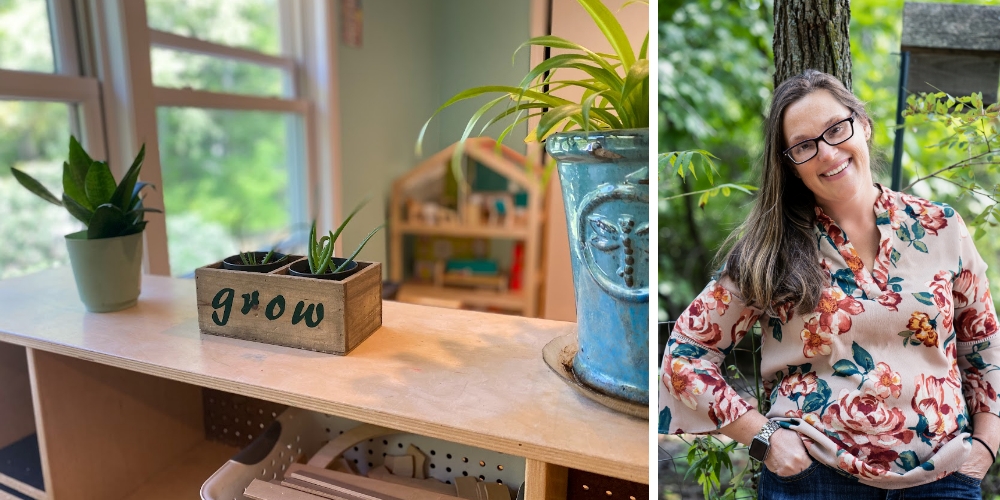 A room at A Place to Grow and Owner Jennifer Legere. (Courtesy of A Place to Grow)
A room at A Place to Grow and Owner Jennifer Legere. (Courtesy of A Place to Grow)
While Jennifer Legere decided to become an elementary school teacher after college, her career path took a sharp turn, guiding her to a job at a biotech company and soon after, veered into entrepreneurship when she opened her own child care center. “I have a degree in secondary education with a focus on natural science and math,” says Legere, owner of A Place to Grow, which now has locations in Brentwood, Durham and Salem after becoming a franchise three years ago.
After teaching middle school and high school, Legere decided to try a new career path working for a biotech company where she learned about business management. However, she left when a new boss told her he didn’t want to promote her because “you’re a woman of birthing years, and you should focus on family and children.”
At that time, Legere had two children aged one and three who were in childcare 11 hours per day. She made the decision to build her own child care center. “I took my business background in project management and made a career out of it,” Legere says.
Legere says the COVID-19 pandemic—which saw 40 centers close in NH—brought NH’s child care crisis into the light. In 2023 the NH Executive Council approved a series of contracts totaling $15.5 million in funds designed to strengthen NH’s child care system.
Also in 2023, the state Senate passed SB 170, which defines what constitutes a “small group child day care center” for licensing that will go into effect in June. The backstory of the bill is interesting, Legere says, because it involved the intersection of child care and affordable housing. When John Randolf opened Harmony Place, an affordable workforce housing complex in Durham, Legere became part of the conversation about an onsite family child care center. “The laws are written in a way that made it difficult to do, so we said, ‘wait, let’s rewrite the law,’” she says. “I call it a micro child care center. It’s up to 12 children, and it follows family care rules.” Micro child care centers are required to have a one-to-six teacher-to-child ratio and can include mixed ages. “You don’t need a large number to be really impactful. Twelve is going to make a big difference in small communities.”
Other bills being taken up this year focus on child care assistance and scholarships for families. “New Hampshire is a child care desert,” Legere says, explaining that there is only one space available for every three children on a wait list.
“The child care industry is filled with women who are passionate about what they do. Our passion drives who we are,” Legere says, adding that those who get into the business of child care sometimes end up having to close because they can’t make ends meet. Her hope is that child care will be seen as part of an essential industry. “Micro business models create opportunities for growth in the child care field allowing women to increase their earning potential as entrepreneurs while reducing the child care desert. Increasing child care capacity also increases workforce recruitment and retention for all NH businesses.” For more information, visit aplacetogrow.com.

 Current Issue - May 2024
Current Issue - May 2024